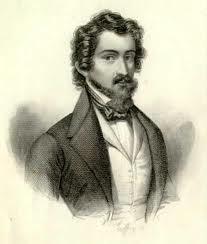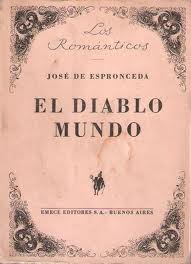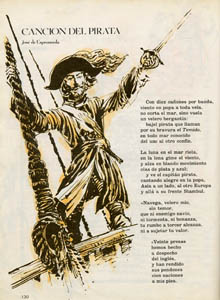Life & works of Jose de Espronceda
José de Espronceda is considered to be one of the most characteristic Spanish Romantic poets, alongside José Zorilla. However he is also considered to be the most rebellious of them. His poems have passed through history from generation to generation, and they're still thought of as amazing examples of the Romantic spirit of the time.
He wrote plenty of short poems which he called "Canciones" (Songs), out of which the better known is "Canción del Pirata", which is still studied and learnt in many schools and summer camps in Spain today. Many of these short poems have main characters which are cast-offs, making it the first time that social topics appeared recurrently in Spanish poetry.
José de Espronceda - Life and Works

Espronceda was born near Badajoz in 1808. His father was part of the military, and when the Spanish War of Independence started, they moved around a lot. Espronceda therefore knew the tragedies of war from a very young age.
In 1820 they moved to Madrid, where Espronceda began his studies in the Spanish school of San Mateo. He was taught by Alberto Lista, a Romantic poet, which probably influenced him towards developing his literary talents. Perhaps it was his mentor's execution in 1823 which pushed Espronceda to found the Masonic patriotic society called "The Numancia", of which he was president. The society was found out, and all its members were incarcerated. Espronceda was convicted to 5 years in a convent-prison in Guadalajara, but his father, who at the time was a colonel, bailed him out.
In 1826 he decided to travel to Lisbon, now the capital of Portugal, which was one of the centers of the Spanish literary movement and home to many Spanish writers. From there he moved to England, and for a few years he traveled around the Netherlands and France, where he probably took part of the Revolution which overthrew the Bourbons and abolished the absolute monarchy. After this he tried to return to Spain and make a living as a writer, but this didn't work so in 1831 he moved back to Paris before deciding to move to London.

Teresa Mancha, Espronceda's love whom he'd met during his time in Lisbon, was living in London. She was married to an older man with whom she wasn't happy, and after seeing Espronceda again, their love was rekindled. She fled with him to Paris in 1831 and in 1833 they moved back to Spain, settling down in Madrid. However, Teresa soon grew tired of their life there and she moved to Valladolid. The lovers were reunited in that city briefly, but the poet had to leave again because of his liberal ideas. Teresa died in 1839 from tuberculosis. The piece 'Canto a Teresa', which can be found in "El Diablo Mundo" was written for her by Espronceda.
After this, Espronceda is admitted in the Guardias de Corps, but he's thrown out after a liberal-patriotic poem of his gets published. He lived in Cuéllar for a few years, during which he wrote "Sancho Saldaña o el castellano de Cuéllar", his only novel. After the novel was done, he moved back to the city of Madrid where he gets named as a representative and found several liberal-democratic newspapers. In 1840 he published "Poesías" and "Diablo Mundo" and in 1841 he's sent to the Spanish Embassy in Holland. He returns to Spain soon after to serve as a representative in Almería, near Granada. Espronceda died in 1842 when he was only 34, from a larynx diphtheria.

Espronceda is considered to be the Spanish Romantic poet par excellence, mainly because of his similarities with Byron, especially in his longer narrative poems like "El Estudiante de Salamanca", which approaches the topic of the Don Juan-type seducers and which is considered to be the best poem of its genre from the 19th century; and the incomplete "El Diablo Mundo", where the poet talks about the innocence of humans and how they are corrupted by the social reality and its evils. Many of his works contain tendencies related to the Romanticist movement. Also, in his works entitled "Himno al sol" and "Óscar y Malvina", Espronceda displayed some similar characteristics to those of the Scottish, Romanticist writer James Macpherson.

